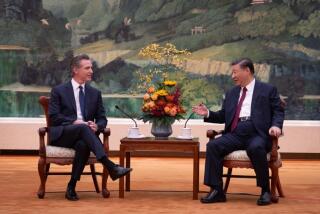Deng Compares Iran Affair to Nixon, Tanaka Scandals
- Share via
BEIJING — Chinese leader Deng Xiaoping, bluntly comparing the Iran- contra affair to the Watergate scandal and Japan’s Lockheed bribery case, today urged Secretary of State George P. Shultz to show understanding for China’s own political upheaval.
Deng told Shultz that President Reagan’s Iran arms problem “doesn’t matter.” But he put a hard edge on his words by comparing Reagan’s situation with those of former President Richard M. Nixon and former Japanese Prime Minister Kakuei Tanaka, who was convicted of accepting nearly $2 million in bribes from the Lockheed Corp. in the 1970s.
‘Different Views’
“I know the President (Reagan) is having some difficulties now, but I think it doesn’t matter,” Deng said. “Former President Nixon also had some difficulties when he was President. We have some different views of his troubles than the people of the United States.”
Nixon shattered more than 20 years of bitter Sino-American hostility with his visit to China in 1972. China has always regarded him with affection, and Chinese leaders never fully understood why the Watergate scandal was considered so important by Americans.
Deng said the Chinese leadership “expressed our understanding” (to Shultz) for Nixon’s situation and for that of Tanaka.
“By engaging in politics and by running the government, one has to meet with some troubles and difficulties,” Deng said. “We also have such a case.”
‘Is That So?’
Shultz, hoping to lighten the mood, replied, “Is that so? I didn’t realize that.”
Pressing his point about China’s political turmoil, Deng said, “As for the troubles we have experienced, I think you and your friends will also express your understanding.”
Shultz replied, “Of course.”
The exchange took place at the start of what later was a private meeting between Shultz and Deng. Reporters were admitted to the opening minutes, and Deng clearly used their presence to make his points.
Ever since Shultz arrived in China on Sunday, lower-ranking Chinese leaders have assured him that the ouster of Communist Party General Secretary Hu Yaobang in January and the current campaign against “bourgeois liberalism,” China’s code word for Western influences, will not affect Beijing’s foreign policy or its relations with the United States.
Rarely Seen in Public
U.S. officials had been waiting for the Shultz-Deng meeting to assess Deng’s own political standing. The 83-year-old leader has been seen in public on only two brief occasions since the ouster of his protege, Hu.
U.S. officials also hoped to discover whether Deng has lost any of his physical or mental acuity.
Deng’s exchange with Shultz seemed to put to rest any questions about his continued alertness. He chuckled once or twice as he spoke and clearly seemed to relish the barbs he was directing at his visitor.
Earlier, on Monday, Shultz issued criticisms of his own. He warned China that if it expels additional Western journalists ,it may jeopardize its friendly--and often profitable--relationship with the United States.
Reminder on Journalists
In a speech at a banquet he gave in honor of Chinese Foreign Minister Wu Xueqian, Shultz said American journalists reporting from China play a vital role in the relationship between the two nations.
He couched his remarks in elliptical and diplomatic language, but, by taking the unusual step of raising the subject at a high-profile social occasion, Shultz demonstrated U.S. concern that the recent expulsion of two journalists might lead to a purge of Western correspondents whose reports displease the Beijing government.
A senior State Department official said later that Shultz, in his private meetings, had spelled out in far more specific terms the U.S. displeasure at the ouster of New York Times correspondent John F. Burns and Lawrence MacDonald, an American citizen employed by Agence-France Presse, the French news agency.
More to Read
Sign up for Essential California
The most important California stories and recommendations in your inbox every morning.
You may occasionally receive promotional content from the Los Angeles Times.












